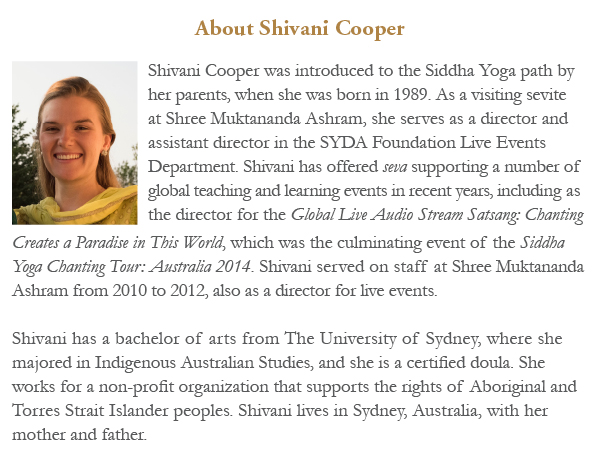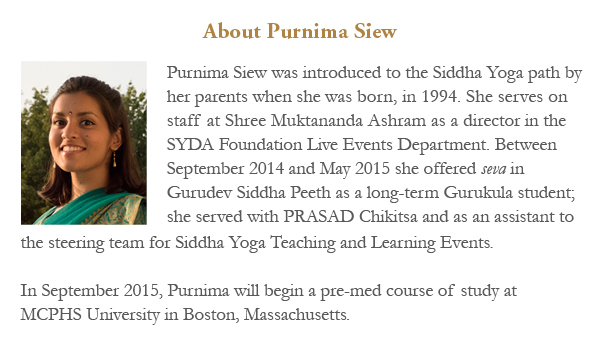Recognizing Divinity
An Account of a Siddha Yoga Chanting Satsang
with Gurumayi Chidvilasananda
Shree Muktananda Ashram
July 4, 2015
By Shivani Cooper and Purnima Siew
Part IV
Someone from the back of the hall called out, “Neat!”
Gurumayi joked with Swami ji, “That word is from the ‘60s, though.” We all laughed along with Swami ji.
Gurumayi then asked everyone present, “How many of you think your life embodies all these words with which Swami ji described your lives as you came forward to introduce yourselves?”
A number of participants raised their hands with confidence and conviction. Gurumayi said, “Quite a few. Great hands. That’s so wonderful. Most writers say it’s best not to overuse adjectives. And we heard during the introductions that some of the participants are accomplished writers and some are studying to become writers. Nonetheless, to recognize when something good happens in your life, it is good to use adjectives. If you feel something wonderful has happened, it’s okay to say, ‘What a wonderful life it is!’ It’s fine to acknowledge that generously.”
With humor and sweetness Gurumayi continued, “I’ve also heard from Siddha Yogis who come from England that Americans use adjectives too much. For everything, Americans say, ‘Great!’ When the British hear this, they like to say, ‘Mellow, mellow down.’ Therefore, sometimes you may not want to say it out loud. But I encourage you to acknowledge in your own mind, in your own heart, how wonderful your life is and how wonderful your life can be. This recognition is pivotal.
“Like attracts like. If you see abundance in your life and you fail to recognize that, then you cannot complain when abundance does not exist for you anymore. If you see love in your life, and you refuse to recognize that, then you cannot complain when you do not feel love. Like attracts like.”
Gurumayi paused, looked at the children, and said, “Children are always beautiful, right?” Gurumayi’s gaze rested on one particular young boy. He looked at Gurumayi and remained quiet. Gurumayi waited for a moment, then said with a smile, “He’s thinking about it.”
Addressing everyone, Gurumayi asked, “How many times have you heard the word beautiful today?”
Without missing a beat, one child called out, “Three times.”
Gurumayi responded, “Three times. That’s lucky. And how many times have you felt beautiful today?”
One five-year-old girl energetically said, “All the time.”
Surprised, Gurumayi asked, “All the time?” and the child nodded firmly.
Gurumayi said, “This child feels beautiful all the time. That’s a beautiful gift. Not all the time do people feel that. Not all the time do people recognize that. Having understood the importance of this recognition, now you can put forth the effort to know that beauty is always present, and it’s your choice to recognize it and experience it. This will allow you to make this world a better paradise.”
“Why do many people worry that nothing is going right in their life? It’s simple. Human beings naturally gravitate toward what is not working, and then make that ‘the thing’ that’s happening in their lives. So today I would like you to bring your attention to what we all heard this young child wholeheartedly proclaim. It is possible to feel beautiful all the time.”
“Like attracts like. Allow yourself to recognize the truth of this philosophy. Do not repeat, ‘Well, this is bad and that is bad, and this is awful and that is awful.’ Instead, give it a try: 'This is… beautiful. That is… wonderful.'”
Gurumayi then gestured to the participants, inviting them to contribute their own adjectives.
One man said, “Stupendous.”
Gurumayi continued, “That is stupendous, that is…”
Participants excitedly called out more adjectives.
“Extraordinary!”
Gurumayi responded, “That is extraordinary. I’ll say “That is…” and then you give me the word. That is…”




